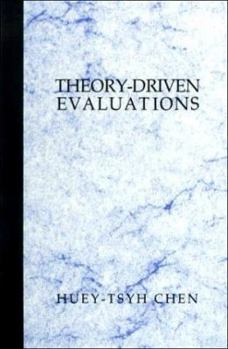Theory Driven Evaluations
Select Format
Select Condition 
Book Overview
With the publication of Theory-Driven Evaluations, Huey-Tsyh Chen has given us an ambitious volume. . . . Indeed, it is the aspiration of this book to provide a conceptual framework that integrates the diverse approaches and paradigms of evaluation. For those of us accustomed to the rhetoric of the paradigm wars that have been raging in recent years, it is refreshing to find a text that works so assiduously at reconciliation. . . . There is much that is useful in Chen′s analysis. He gives us a full and thoughtful book that attempts no less than the construction of a conceptual framework for all of program evaluation. . . . It provides an impressive compendium of source material and references spanning not only evaluation, but related work in economics and public policy (this alone is worth the price of the book). . . . Chen′s Theory-Driven Evaluations provides a stimulating, even heroic attempt to bring some conceptual integration to a field that has been too long dominated by methodological paradigms and procedural particulars. --a prepublication review for Evaluation and Program Planning "Generous use of examples which are well selected and lucidly summarized." --Contemporary Sociology "Chen introduces a new, comprehensive framework for program evaluation that is designed to bridge the gap between method and theory-oriented perspectives. . . . For program planners, decision makers, scholars, and students, this volume clarifies, illuminates and provides unique insights into the conception, construction and implementation of a wide range of programs. . . . The research examples used in the discussion draw upon various areas, such as education, welfare, health, criminal justice, job training and] family construction to attract a wider audience." --Journal of Applied Rehabilitation Counseling Program evaluation has traditionally emphasized the application of social science research methods in evaluation activities. However, there is a growing awareness that program theory is vital for broadening the scope and enhancing the usefulness of program evaluation. In Theory-Driven Evaluations, Huey-Tsyh Chen introduces a new, comprehensive framework for program evaluation that is designed to bridge the gap between the method- and theory-oriented perspectives. He provides an intensive discussion of the nature and functions of program theory, approaches to constructing program theories, and the integration of program theory with evaluation processes. Specific types of theory-driven evaluations, as well as principles and guidelines for application are developed for meeting different policy purposes. Application of systematic strategies is illustrated by concrete examples from a variety of evaluation studies in different fields. The presentation of this new perspective directly addresses the needs and concerns in both the professional and applied areas of program evaluation. For program planners, decisionmakers, scholars and students, this volume will clarify, illuminate, and provide unique insights into the conception, construction, and implementation of a wide range of programs.
Format:Paperback
Language:English
ISBN:0803958994
ISBN13:9780803958999
Release Date:May 1994
Publisher:Sage Publications
Length:328 Pages
Weight:1.05 lbs.
Dimensions:1.0" x 5.5" x 8.5"
Customer Reviews
1 rating
Evaluation Classic
Published by Thriftbooks.com User , 18 years ago
Chen's book, and his subsequent work, introduced the role of program theory and program logic diagrams as core elements essential to evaluaton method. This approach supports the blending of "hard science" schools of evaluation that stress scientific method, random samples, experimential and quasi-experimental design with the naturalistic, social relations oriented schools by emphasizing the importance of bringing to an evaluation extensive subject-matter knowledge for the development of program theory. Program theory (and associated logic diagrams) then takes precedence in framing the research questions and indicating how methods should be deployed, as well as how quantitative and qualitative methods should be configured in an evaluation. This is different from the simple joining of impact and process evaluation on a project because it moves some elements of process evaluation to the heart of strategy for impact evaluation, and improves both quantitative and qualitative results for both internal validity and generalization. Chen proposes an extensive typology for these relationships. In some ways the book documents a conceptual breakthough for evaluation that also occurs in every social science that has experienced a "struggle of methods" between schools of quantitative and qualitative insights. There are "many roads to the city," and Campbell's quasi-experimental design school, for example, includes these synergies in practical work. But this is the book that made the difference in this field (evaluation). It is quite well written, clear, and can serve as a core text on evaluation method.





